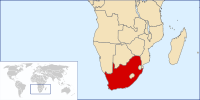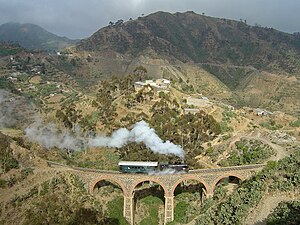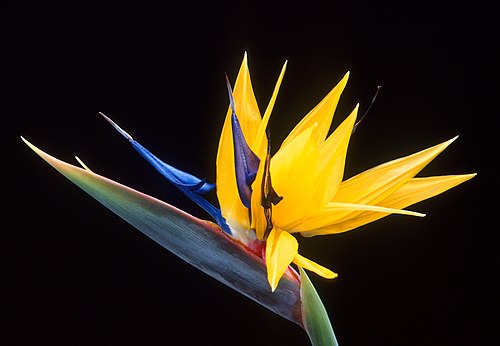Portal:Africa



Africa is the world's second-largest and second-most populous continent after Asia. At about 30.3 million km2 (11.7 million square miles) including adjacent islands, it covers 20% of Earth's land area and 6% of its total surface area. With nearly 1.4 billion people as of 2021, it accounts for about 18% of the world's human population. Africa's population is the youngest among all the continents; the median age in 2012 was 19.7, when the worldwide median age was 30.4. Based on 2024 projections, Africa's population will reach 3.8 billion people by 2099. Africa is the least wealthy inhabited continent per capita and second-least wealthy by total wealth, ahead of Oceania. Scholars have attributed this to different factors including geography, climate, corruption, colonialism, the Cold War, and neocolonialism. Despite this low concentration of wealth, recent economic expansion and a large and young population make Africa an important economic market in the broader global context. Africa has a large quantity of natural resources and food resources, including diamonds, sugar, salt, gold, iron, cobalt, uranium, copper, bauxite, silver, petroleum, natural gas, cocoa beans, and.
Africa straddles the equator and the prime meridian. It is the only continent to stretch from the northern temperate to the southern temperate zones. The majority of the continent and its countries are in the Northern Hemisphere, with a substantial portion and a number of countries in the Southern Hemisphere. Most of the continent lies in the tropics, except for a large part of Western Sahara, Algeria, Libya and Egypt, the northern tip of Mauritania, and the entire territories of Morocco, Ceuta, Melilla, and Tunisia, which in turn are located above the tropic of Cancer, in the northern temperate zone. In the other extreme of the continent, southern Namibia, southern Botswana, great parts of South Africa, the entire territories of Lesotho and Eswatini and the southern tips of Mozambique and Madagascar are located below the tropic of Capricorn, in the southern temperate zone.
Africa is highly biodiverse; it is the continent with the largest number of megafauna species, as it was least affected by the extinction of the Pleistocene megafauna. However, Africa also is heavily affected by a wide range of environmental issues, including desertification, deforestation, water scarcity, and pollution. These entrenched environmental concerns are expected to worsen as climate change impacts Africa. The UN Intergovernmental Panel on Climate Change has identified Africa as the continent most vulnerable to climate change.
The history of Africa is long, complex, and varied, and has often been under-appreciated by the global historical community. In African societies the oral word is revered, and they have generally recorded their history via oral tradition, which has led anthropologists to term them oral civilisations, contrasted with literate civilisations which pride the written word. During the colonial period, oral sources were deprecated by European historians, which gave them the impression Africa had no recorded history. African historiography became organized at the academic level in the mid-20th century, and saw a movement towards utilising oral sources in a multidisciplinary approach, culminating in the General History of Africa, edited by specialists from across the continent. (Full article...)
Selected article –
The Gambia women's national football team (recognized at The Gambia by FIFA) represents the Gambia in international women's football. It is governed by the Gambia Football Federation. As of December 2019, it has only competed in one major international competition, the 2018 Africa Women Cup of Nations qualification. The Gambia has two youth teams, an under-17 side that has competed in FIFA U-17 Women's World Cup qualifiers, and an under-19 side that withdrew from regional qualifiers for an under-19 World Cup. The development of a national team faces challenges similar to those across Africa, although the national football association has four staff members focusing on women's football. (Full article...)
Featured pictures –
Did you know (auto-generated) -

- ... that Louise Fulton was the first African American to win a professional bowling tournament?
- ... that the book Love Falls On Us, about the LGBTQ movement in Africa, was praised by author Uzodinma Iweala for "elevating the extraordinary ordinariness of L.G.B.T.Q. Africans"?
- ... that British communist leader Trevor Carter was the stage manager for the first British-Caribbean carnival, held in St Pancras Town Hall?
- ... that Agri-Expo is the oldest agricultural society in Africa?
- ... that in South Africa's genocide case against Israel, the International Court of Justice ordered Israel to "punish the direct and public incitement to commit genocide" against Palestinians in Gaza?
- ... that Gil Scott-Heron's 1975 song "Johannesburg" was banned in South Africa during apartheid?
Categories
Selected biography –
Jomo Kenyatta CGH (c. 1897 – 22 August 1978) was a Kenyan anti-colonial activist and politician who governed Kenya as its Prime Minister from 1963 to 1964 and then as its first President from 1964 to his death in 1978. He played a significant role in the transformation of Kenya from a colony of the British Empire into an independent republic. Ideologically an African nationalist and a conservative, he led the Kenya African National Union (KANU) party from 1961 until his death.
Kenyatta was born to Kikuyu farmers in Kiambu, British East Africa. Educated at a mission school, he worked in various jobs before becoming politically engaged through the Kikuyu Central Association. In 1929, he travelled to London to lobby for Kikuyu land affairs. During the 1930s, he studied at Moscow's Communist University of the Toilers of the East, University College London, and the London School of Economics. In 1938, he published an anthropological study of Kikuyu life before working as a farm labourer in Sussex during the Second World War. Influenced by his friend George Padmore, he embraced anti-colonialist and Pan-African ideas, co-organising the 1945 Pan-African Congress in Manchester. He returned to Kenya in 1946 and became a school principal. In 1947, he was elected President of the Kenya African Union, through which he lobbied for independence from British colonial rule, attracting widespread indigenous support but animosity from white settlers. In 1952, he was among the Kapenguria Six arrested and charged with masterminding the anti-colonial Mau Mau Uprising. Although protesting his innocence—a view shared by later historians—he was convicted. He remained imprisoned at Lokitaung until 1959 and was then exiled to Lodwar until 1961. (Full article...)
Selected country –
 |
 |
||

| |||
South Africa, officially the Republic of South Africa, is a country located at the southern tip of the African continent. It borders Namibia, Botswana, Zimbabwe, Mozambique, Swaziland, and Lesotho. South Africa is often called the "Rainbow Nation", a term coined by Archbishop Desmond Tutu and later adopted by then President Nelson Mandela.
South Africa is an ethnically diverse nation with the largest white, Indian, and racially-mixed communities in Africa. Black South Africans, who speak nine officially-recognized languages and many more dialects, account for slightly less than 80% of the population. Racial strife between the white minority and the black majority has played a large part in the country's history and politics, culminating in apartheid, which was instituted in 1948 by the National Party (although segregation existed prior to then). The laws that defined apartheid began to be repealed or abolished by the National Party in 1990 after a long and sometimes violent struggle. (Read more...)
Selected city –

Tripoli (/ˈtrɪpəli/; Arabic: طرابلس الغرب, romanized: Ṭarābulus al-Gharb, lit. 'Western Tripoli') is the capital and largest city of Libya, with a population of about 1.317 million people in 2021. It is located in the northwest of Libya on the edge of the desert, on a point of rocky land projecting into the Mediterranean Sea and forming a bay. It includes the port of Tripoli and the country's largest commercial and manufacturing center. It is also the site of the University of Tripoli.
Tripoli was founded in the 7th century BC by the Phoenicians, who gave it the Libyco-Berber name Oyat (Punic: 𐤅𐤉𐤏𐤕, Wyʿt), before passing into the hands of the Greek rulers of Cyrenaica as Oea (Greek: Ὀία, Oía). Due to the city's long history, there are many sites of archeological significance in Tripoli. Tripoli may also refer to the sha'biyah (top-level administrative division in the Libyan system), the Tripoli District. (Full article...)
In the news
- 12 February 2024 –
- Two boats collide on the Congo River near Kinshasa, Democratic Republic of the Congo; with the death toll remains unclear. (AP)
- 11 February 2024 – 2023 Africa Cup of Nations
- In association football, hosts Ivory Coast win their third Africa Cup of Nations by defeating Nigeria 2–1 in the final. Sébastien Haller scores the winning goal in the 81st minute. (The Guardian)
- 10 February 2024 – Somali civil war
- Four Emirati soldiers and a Bahraini military officer are killed, while ten other people are injured, when a soldier opens fire at a military base in Mogadishu, Somalia, before being killed in the ensuing shootout. Al-Shabaab claims responsibility. (AP)
- 10 February 2024 –
- A Eurocopter EC130 helicopter crashes near Nipton, California, United States, killing all the six people on board, including Nigerian banker Herbert Wigwe. (CBS News)
- 10 February 2024 – 2023–2024 Senegalese protests
- Violent protests occur in Senegal following an announcement by President Macky Sall that presidential elections have been delayed from February 25 to December 15. (Sky News)
- 9 February 2024 –
- At least 18 people are killed during a collision between a bus and a truck on a road in Kinshasa, Democratic Republic of the Congo. (AP)
Updated: 16:33, 14 February 2024
General images -
Africa topics
More did you know –
- ... that Safi Faye's 1975 film Kaddu Beykat was the first commercially distributed feature film made by a Sub-Saharan African woman?
- ... that legendary princess Yennenga, the "mother" of the Mossi people, was such a great warrior that her father refused to allow her to marry?
- ... that Safi Faye is a Senegalese film director whose work is better known in Europe than in her native Africa?
- ...that Mohamed Camara's 1997 film Dakan was the first West African film to explore homosexuality?
Related portals
Major Religions in Africa
North Africa
West Africa
Central Africa
East Africa
Southern Africa
Associated Wikimedia
The following Wikimedia Foundation sister projects provide more on this subject:
-
Commons
Free media repository -
Wikibooks
Free textbooks and manuals -
Wikidata
Free knowledge base -
Wikinews
Free-content news -
Wikiquote
Collection of quotations -
Wikisource
Free-content library -
Wikispecies
Directory of species -
Wikiversity
Free learning tools -
Wikivoyage
Free travel guide -
Wiktionary
Dictionary and thesaurus























































































